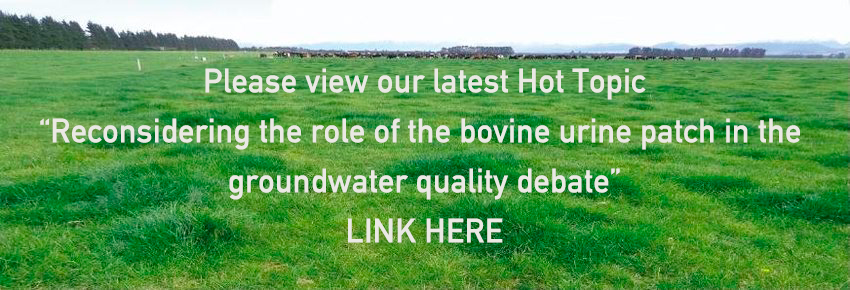In this newsletter, I am happy to report on the Kiwibank New Zealander of the Year; a major international science symposium hosted in New Zealand; and can warmly welcome a government commitment to reform gene technology regulation to facilitate research. However, not so cheerfully, I share the anxieties of NZIAHS members – and the whole of the science and research sector – while we await news of the government’s funding intentions for public science institutions.
New Zealander of the Year
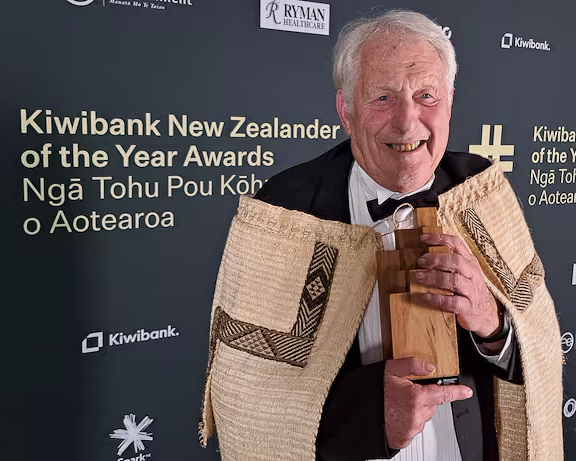 The NZIAHS congratulates Dr Michael James Salinger (better known to us as Jim Salinger) who has been named as the Kiwibank New Zealander of the Year, Te Pou Whakarae o Aotearoa.
The NZIAHS congratulates Dr Michael James Salinger (better known to us as Jim Salinger) who has been named as the Kiwibank New Zealander of the Year, Te Pou Whakarae o Aotearoa.
One of the first scientists to address global warming, Jim has been involved for almost 50 years in research and analysis of climate change and variability and its impact.
His many achievements include the first detection of global warming in 1976 and leading research on past and present climate in New Zealand and the South Pacific and its impacts, especially on agriculture. In recent years he has been investigating climate extremes including drought, and documenting the shrinkage of ice volume in the NZ Southern Alps.
Jim is an inexhaustible publisher in academic journals and a prolific communicator about climate change. He was the lead author for the Intergovernmental Panel on Climate Change in 2007, which collectively was awarded a Nobel Peace Prize “for their efforts to build up and disseminate greater knowledge about man-made climate change, and to lay the foundations for the measures that are needed to counteract such change”. His contributions to the climate debate have included lead authorship of most New Zealand-based scenarios “to facilitate impact and policy studies”.
Born in Dunedin in 1947, Jim completed a Bachelor of Science from the University of Otago in 1971, a Doctor of Philosophy from Victoria University in Wellington in 1981 and a Master of Philosophy in Environmental Law from the University of Auckland in 1999.
He was awarded the NZ Science and Technology Medal in 1994 for ground-breaking research on Southern Hemisphere climate change.
Jim is a prolific author, with an extensive academic publication record. He is recognised for his involvement with the 2018 World Meteorological Organisation Award. In 2019 Jim received the NZIAHS Jubilee Medal in recognition of his lifetime achievements in climate and agricultural science. He was made Companion of the Royal Society of New Zealand in 2001.
However, this has not stopped his involvement, as an author, with an extensive academic publication record, and also the recognition of his involvement, with the 2018 World Meteorological Organisation Award and in 2019 the NZIAHS Jubilee Medal in recognition of his lifetime achievements in climate and agricultural science. He was made Companion of the Royal Society of New Zealand in 2001.
Jim is currently an adjunct research fellow with the School of Geography, Environmental and Earth Sciences at Victoria University.
XI International Symposium on Kiwifruit
The global kiwifruit science community came together at the end of February for the XI International Symposium on Kiwifruit themed on ‘Diversifying for Future Uncertainty’. Under the auspices of the International Society for Horticultural Science (ISHS), the event was hosted jointly by The New Zealand Institute for Plant and Food Research Ltd (PFR) and Zespri at the Mercury Baypark Arena in Mount Maunganui.
The global kiwifruit science community came together at the end of February for the XI International Symposium on Kiwifruit themed on ‘Diversifying for Future Uncertainty’. Under the auspices of the International Society for Horticultural Science (ISHS), the event was hosted jointly by The New Zealand Institute for Plant and Food Research Ltd (PFR) and Zespri at the Mercury Baypark Arena in Mount Maunganui.
The symposium was opened with a plenary talk by Kate Meyer, ‘Planetary facts of a kiwifruit’. The scientific presentations covered a wide range of kiwifruit science, with 76 oral presentations and 42 posters. Talks covered a range of different area of research, including genetics and breeding, vine management, control of pests and diseases, fruit quality and postharvest systems.
Keynote scientific presentations were made by Francesco Spinelli, ‘Kiwifruit vine decline syndrome and other emerging and re-emerging biosecurity challenges’, and Takashi Akagi ‘Boy meets girl, everywhere? Mysteries in neo-sex chromosome evolution in kiwifruit’.
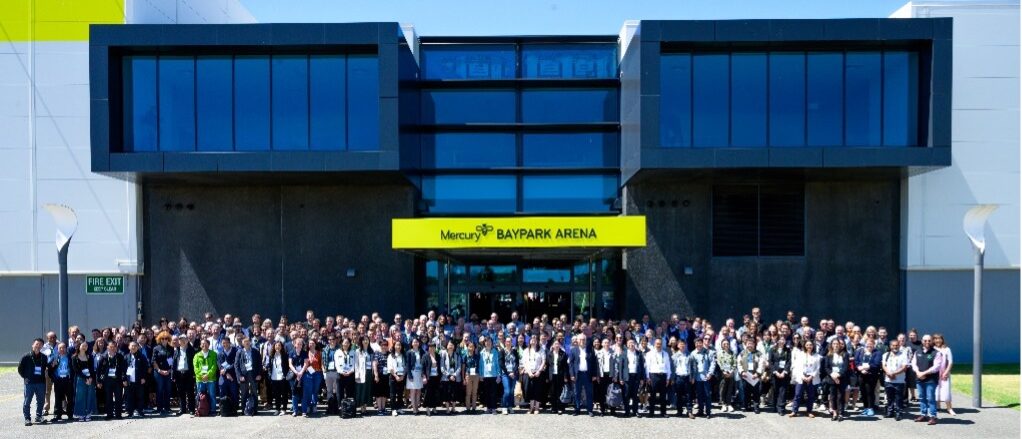 |
| Attendees at the XI International Symposium on Kiwifruit held in Mount Maunganui, 20-24 February, 2024. There were more than 230 attendees from 17 countries. |
Attendees had the opportunity to participate in two workshops: ‘Fruit quality: mind the gap’ hosted by Frank Bollen and Jem Burdon and ‘Carbon farming and hi-tech tools for climate resilience on orchard’ hosted by Steve Green and Marco Mastroleo. ISHS Young Minds Award winners were PhD student Olivia Kelly for her oral presentation and PhD student Andrea Strano for his poster. Poster sessions, orchard and packhouse technical visits and the conference dinner, along with breaks between sessions, all provided ample opportunity for interactions and scientific discussions among the attendees.
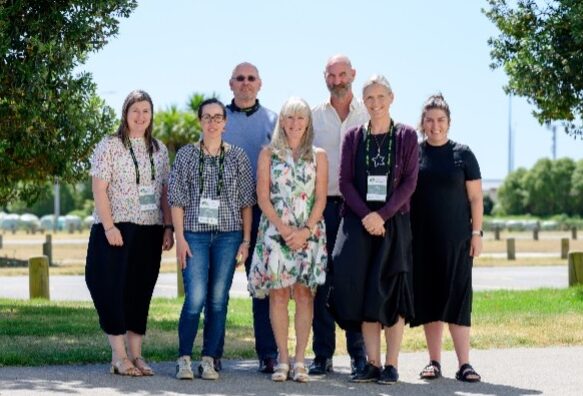 |
| The local organising committee: Left to right Sarah Pilkington (co-convener), Simona Nardozza, Jem Burdon, Yvonne McDiarmid (all PFR), Greg Clark, Juliet Ansell (co-convener) and Nikita Fraser (all Zespri). Liz Duston (PFR) not present. |
The organisers would like to thank all of the sponsors and exhibitors, without whose support these events would not be possible. The next symposia will be held in Matera, Italy in 2027 and then Thessaloniki, Greece in 2030.
Gene technology rules to be relaxed 
Judith Collins, Minister of Science, Innovation and Technology, brought good news to our sector when she addressed a summit organised by BioTechNZ and NZTech. She assured her audience that her Government would reform gene technology regulation to give researchers the tools they have been calling for.
Ms Collins said she had a deep appreciation for what biotechnology can deliver and the enormous potential benefits for New Zealand, from making advances in health science, combatting climate change, to lifting agricultural productivity and boosting exports. She said: “While innovations such as CRISPR have made gene technologies more predictable and safer than ever, New Zealand’s outdated rules make it all but impossible for you to apply these technologies outside the lab.”
Under the current Hazardous Substances and New Organisms Act, fewer than 10 Gene Edited or Genetically Modified products have been approved for release outside labs, the Minister reminded her audience. No commercial GE or GM crops are grown in New Zealand, and no fresh produce developed using gene technologies is sold here.
Countries like Australia, Japan and the United Kingdom have safely embraced gene technologies, and the European Union is working to liberalise its rules.
The Government’s plan is to reform New Zealand’s gene technology rules, ensuring that scientists are empowered to do their research here, rather than being forced to go overseas for trials and field testing.
Mind you, the Government is in a much bigger hurry to get on with some other reforms. Ms Collins said it will pass GM legislation by the end of 2025 to enable greater use of gene technologies while ensuring strong protections for human health and the environment.
The new rules will be future focused and designed to accommodate advances in gene technologies and methods. They will be based on managing the risks of these technologies, rather than focusing solely on the methods of genetic modification. The regulator will oversee the new system and ensure ethical and cultural concerns are well managed.
Ms Collins said the new regimen will involve a streamlined approval process to reduce the burden on both scientists and businesses, and help ease the way through the approvals process so applicants do not get lost in confusing bureaucracy.
Science-sector financing anxieties
When it comes to the future shape of the science sector, Ms Collins has given some pointers to what is in the offing. But a great deal remains to be announced about the extent of public funding that will be provided for state-sector science institutions from a government committed to reducing public spending. She said she intends to encourage private participation and co-investment in the sector and incentivise areas of focus for science and research with commercial value.
Scientists wanting a better understanding of what the Government intends would have been unnerved when Callaghan Innovation issued a document to staff, outlining its “strategic reset”.
According to RNZ, the document said the organisation needed to “reduce in size” and focus “exclusively on revenue generating, commercial science services”.
In a statement to RNZ. Ms Collins said: “As Crown companies, Crown Research Institutes (CRIs) have not been directly asked to make any cost savings. CRIs are required under the Crown Research Institute Act 1992 to operate in a financially responsible manner to
In another statement – this time to Newshub – the Minister said: “It is my expectation that the Board continues to ensure that Callaghan Innovation is financially sustainable into the future. I intend to identify and implement changes that improve the efficiency of the entire science, innovation and technology sector with minimal disruption, while being cognisant of the fact we are operating in an extremely tight fiscal environment.”
The Government has also announced the scrapping of the Labour Government’s major science reform plan, Te Ara Paerangi. That plan included a $450 million plan to turn Wellington into a ‘science city’.
Meanwhile, the Government’s 10 year $680 million 10-year National Science Challenge projects are coming to an end. Coupled with the on-going situation of the University sector finances, there is still plenty to be resolved.
Late in March the Government announced two new advisory groups, one for the science sector and the other for universities. Both groups will be chaired by Professor Sir Peter Gluckman and will advise the Government on how those sectors can play a greater role in lifting New Zealand’s productivity and economic growth.
The Performance-Based Research Fund is being put on hold, and will reviewed by the University Advisory Group.
It looks like scientists must live with uncertainty a little longer.
Save the Date
Wednesday 23rd October 2024 at Lincoln University, Canterbury
Annual NZIAHS awards
|
Obituary
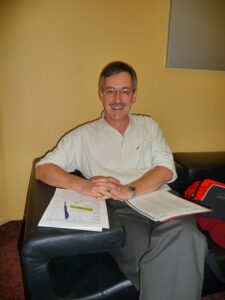 Rod Oram
Rod Oram
My sympathies – and those of the NZIAHS – are extended to the family of journalist and environmentalist Rod Oram, who served as a facilitator at several institute forums. Aged 73, he died in Auckland Hospital two days after suffering a cardiac arrest and crashing off his bike in Auckland.
An obituary posted on Newsroom said British-born Rod had been a high-profile contributor to that on-line publication almost since its foundation in 2017, focusing his weekly columns on the economy, business and the climate and ecological crises facing the country and globe.
Rod came to New Zealand in 1997 to launch the Business Herald section of the New Zealand Herald. He had been a writer and editor at the Financial Times newspaper, reporting from the UK, Asia and North America.
After leaving the Herald, he contributed a column at the Sunday Star-Times paper for about 15 years and was a regular business commentator on RNZ’s Nine to Noon programme.
Rod was an Edmund Hillary Fellow, a “community of 500-plus innovators, entrepreneurs and investors committed to New Zealand as a basecamp for global impact”.
After filing his last Sustainable Future newsletter for Newsroom this month, Rod was off again taking up the good fight: “Apologies I’ve written long. But I’m sending it now because I’m scooting off to speak at a regen ag meeting in the Far North.”
Obituary
Ross Duder 1940 – 2024
Born in war-time England Ross spent much of his childhood on or near an Auckland North Shore beach. However he chose Agriculture as his career path. After completing his B.Agr.Sc. at Massey in 1965 he was employed by the Department of Agriculture as a Farm Advisory Officer stationed in Kaitaia, Whangarei and Morrinsville. A spell of activity based in Ruakura grounded him in the basics of regional field trials which became a major part of his subsequent frenetic life. A professional he joined the NZIAS in 1965 and retained his active membership until his death, some 59 years later.
Trevor Ellett a Massey graduate and then Dairy Science lecturer returned to his family land at Mangere near Auckland’s Airport in 1951. Over the next two decades he identified ryegrass plants on his farm that out-persisted all others available at that time. Through his earlier contacts he had samples incorporated into breeding and selection programs at DSIR Grasslands in Palmerston North but no commercial selections from Ellett’s originals were released by them.
In 1970 Ross accepted an invitation to join Arthur Yates Ltd as the Research Agronomist for developing forage seeds. An address by Jack Yates to Auckland Section of NZIAS in 1971 about the plans for Yates Ltd to become players in the forage seed market, attended by Trevor and Ross, led to Ellett signing a deal with Yates for developing his persistent “Mangere Ryegrass”. Ross Duder was the lead and only agronomist for this project with 4,500 spaced plants on Ellett’s farm followed in the next several years by more than ten trial sites from Kaitaia to Gore. Ross was supported by Yates Ltd to undertake the postgraduate Dip.Agr.Sc. in 1975 at Massey specialising in Plant Breeding.
The outcome of this work led to “Ellett Ryegrass”, the first Certification of a pasture variety under the Plant Variety Rights Act of a variety bred and selected by a commercial company in New Zealand. All earlier Certifications had been by government DSIR breeders. Ross, an ever-observant field scientist, was also the first to recognise Ellett Ryegrass’ resistance to Argentine Stem Weevil that led others to elucidate the role of endophytes in this resistance. Parallel to the Ellett ryegrass program, Yates Ltd gained the agency for USA-based Pioneer Corn in 1973. Over the next 14 years Ross, now National Extension Specialist, played a major role not only expanding Yates’ share of the New Zealand hybrid maize grain market to 70% but also expanding the geographic spread of maize plantings well into the South Island.
In 1987 Ross was made redundant when Equity Corp, who owned Yates Ltd, was liquidated. He re-established himself as a private consultant, Ross Duder and Associates Ltd. At this time he also joined the New Zealand Institute of Primary Industry Management (NZIPIM). His client base ranged widely across dairy, sheep, beef, equine and maize cropping enterprises and included the Auckland Council for management of the grazing activities on numerous volcanic cones. He was a co-opted industry member of the Northern North Island Arable Research Group for The Foundation for Arable Research (FAR). His wide network of associates in the primary sector led to his active organisation of many seminars and field trips for both NZIAHS and NZIPIM. He served for many years on the Auckland Section of NZIAHS committee and also the committee and Council of the NZIPIM. A Fellowship of the NZIPIM was conferred on Ross in 2005. Ross had a huge capacity to absorb new developments and see linkages that led sometimes to novel viewpoints. Ross, highly sociable and a good listener, had an infectious enthusiasm for the primary industry and was deeply respected for his opinions and his integrity.
NZIAHS extends its condolences to his wife Helen and family.
William Atkinson & Ian Rodger
Auckland Section
 |
Jeremy Burdon
NZIAHS President
|

